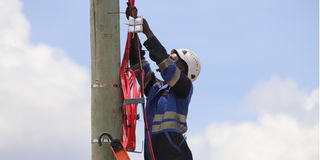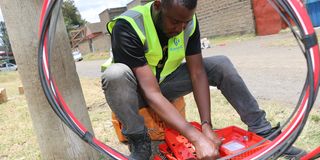New Kenya Power guidelines cause internet outage in several parts of Nakuru

An internet service provider technician working on replacing the thin black cables to have a neat connection as required from ISPs using Kenya Power poles on March 12, 2025.
Nakuru Internet Service Providers (ISPs) have incurred huge financial losses in recent weeks, following Kenya Power’s decision to remove internet cable installations from their poles.
According to Kennedy Konah, a service provider, the national power transmitter has been cutting down internet transmission cables in areas such as Mawanga, Kenlands, Kiamunyi, Kiamunyeki, Freehold, and parts of the city centre, among others.
Konah notes that this action was taken after several service providers failed to comply with Kenya Power’s installation procedures, thus resulting to a growing number of illegal fibre optic cable mountings by unlicensed operators.

Internet connection cables on a Kenya Power pole along Court road. Photo taken on March 12, 2025.
“Kenya Power has been allowing ISPs to run their cables on its poles at a fee. However, some providers devised ways to avoid paying and instead mounted their cables in a substandard manner, which prompted Kenya Power to cut down all the cables,” he explains.
Konah further states that Kenya Power has specific standards for internet cable installations.
“If you check most poles, ISPs were using thin black internet cables to share internet connections. This made it difficult to distinguish between licensed and unlicensed operators, allowing unauthorized providers to mount their cables without detection,” he says.
In terms of cost, he notes that many small-scale internet providers will be hit hard, as they may not be able to afford the expenses of reconnecting their networks.
“A kilometre of the black cable previously used cost around Sh 6,000, but the newly recommended cable now costs Sh 30,000 per kilometre. This price increase will push many small-scale internet providers out of the market,” he explains.
On the other hand, Konnect’s technical director, Edwin Wanjiku, reveals that the company has suffered losses amounting to tens of millions.

Konnect internet staff during internet reconnection in Freehold on March 12,2025.
However, he acknowledges that ISPs had received a three-month notice before the disconnections during a roundtable meeting with industry stakeholders.
“As Konnect, we are currently on the ground installing a new cable system as per the recommendations to ensure compliance with the required standards. The cables must now be color-coded to identify and distinguish licensed operators from unlicensed ones. Our cables are red and white striped, while other companies have different colours. This entire process is being coordinated by TESPOK (Technology Service Providers Association of Kenya), which represents technology service providers in Kenya,” he explains.
Additionally, he highlights that clients who have gone several days without an internet connection will also need to be compensated, with some experiencing outages for close to seven days.
Edwin acknowledges that while enforcing standards is beneficial, he hopes the measures will be long-term to ensure that registered ISPs receive fair treatment for adhering to regulations.
Chris Ngotho, a PlayStation business operator, says he suffered huge losses due to the week-long internet outage in Freehold.
“In a day, I can make up to Sh 2,000 in profit, but I had to close my shop since I couldn’t afford the extra cost of getting an internet connection after already paying my monthly subscription,” he explains, saying he is glad to see ISPs working on reconnection, hoping he can reopen his business this week.
